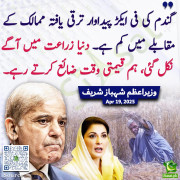
لاہور: پاکستانی اداکار دانش تیمور کو ایک نجی ٹی وی چینل کے رمضان ٹرانسمیشن پروگرام میں دیے گئے بیان پر شدید تنقید کا سامنا کرنا پڑا، جس کے بعد انہیں معافی مانگنی پڑی۔ دانش تیمور کی اہلیہ اور اداکارہ عائزہ خان کے ساتھ ہونے والی اس گفتگو میں دانش نے چار شادیوں کے حوالے سے ایک بیان دیا تھا، جس نے سوشل میڈیا پر طوفان کھڑا کر دیا۔
دانش تیمور نے پروگرام میں کہا تھا، "مجھے اللہ کی طرف سے چار شادیوں کی اجازت ہے، میں فی الحال ایسا نہیں کر رہا۔" ان کے الفاظ، خاص طور پر "فی الحال" کے استعمال نے ناظرین اور سوشل میڈیا صارفین کو ناراض کر دیا، جنہوں نے دانش پر اپنی اہلیہ کی بے عزتی کرنے کا الزام لگایا۔
تنقید کے بعد، دانش تیمور نے اپنے انسٹاگرام اکاؤنٹ پر ایک ویڈیو شیئر کرتے ہوئے معافی مانگتے ہوئے کہا، "میں جانتا ہوں کہ آپ لوگ مجھ سے ناراض ہیں۔ میرے کچھ پرستاروں کو لگتا ہے کہ میں نے اپنی بیوی عائزہ کی بے عزتی کی، لیکن ایسا نہیں ہے۔ میں اپنی بیوی سے پیار کرتا ہوں۔ میرے الفاظ کا چناؤ شاید صحیح نہیں تھا۔ میں اکثر لفظ 'فی الحال' استعمال کرتا ہوں، جو موجودہ حالات کی طرف اشارہ کرتا ہے۔"
دانش نے مزید کہا، "مجھے یقین ہے کہ ہم سب ایک دن مر جائیں گے۔ الحمدللہ، میں نے زندگی میں کبھی تنازعات نہیں بنائے۔ اس معاملے کو ختم کر دینا چاہیے۔ جب میری نیت ہی ایسی نہیں ہے اور دل ایسا نہیں ہے، تو بات کو بڑھانے کا کوئی فائدہ نہیں۔ اگر لوگوں کو لگتا ہے کہ میری بات سے ان کی دل آزاری ہوئی ہے، تو میں معافی مانگتا ہوں۔ میں آپ کو پریشان نہیں کرنا چاہتا۔ میں نے آپ کو انٹرٹین کرنے کے لیے اپنی زندگی وقف کی ہے، اور میں چاہتا ہوں کہ آپ سب خوش رہیں، جیسے میں اپنے گھر میں اپنی بیوی اور بچوں کے ساتھ خوش رہتا ہوں۔"
https://twitter.com/x/status/1902453746766114881 دانش تیمور کا یہ بیان سوشل میڈیا پر وائرل ہو گیا، جہاں صارفین نے ان کے الفاظ پر سخت ردعمل ظاہر کیا۔ کئی صارفین نے کہا کہ دانش کا یہ بیان غیر ضروری تھا اور اس سے ان کی اہلیہ کی عزت کو ٹھیس پہنچی ہے۔ تاہم، دانش کی معافی کے بعد کچھ صارفین نے ان کے موقف کو سمجھنے کی کوشش کی اور اس معاملے کو ختم کرنے کی اپیل کی۔
یہ واقعہ ایک بار پھر اس بات کی عکاسی کرتا ہے کہ کس طرح مشہور شخصیات کے بیان سوشل میڈیا پر تنقید کا نشانہ بن سکتے ہیں۔ دانش تیمور نے اپنے بیان کے بعد معافی مانگ کر اس معاملے کو ختم کرنے کی کوشش کی ہے، لیکن اس واقعے نے انہیں ایک بار پھر بحث کا مرکز بنا دیا ہے۔





























